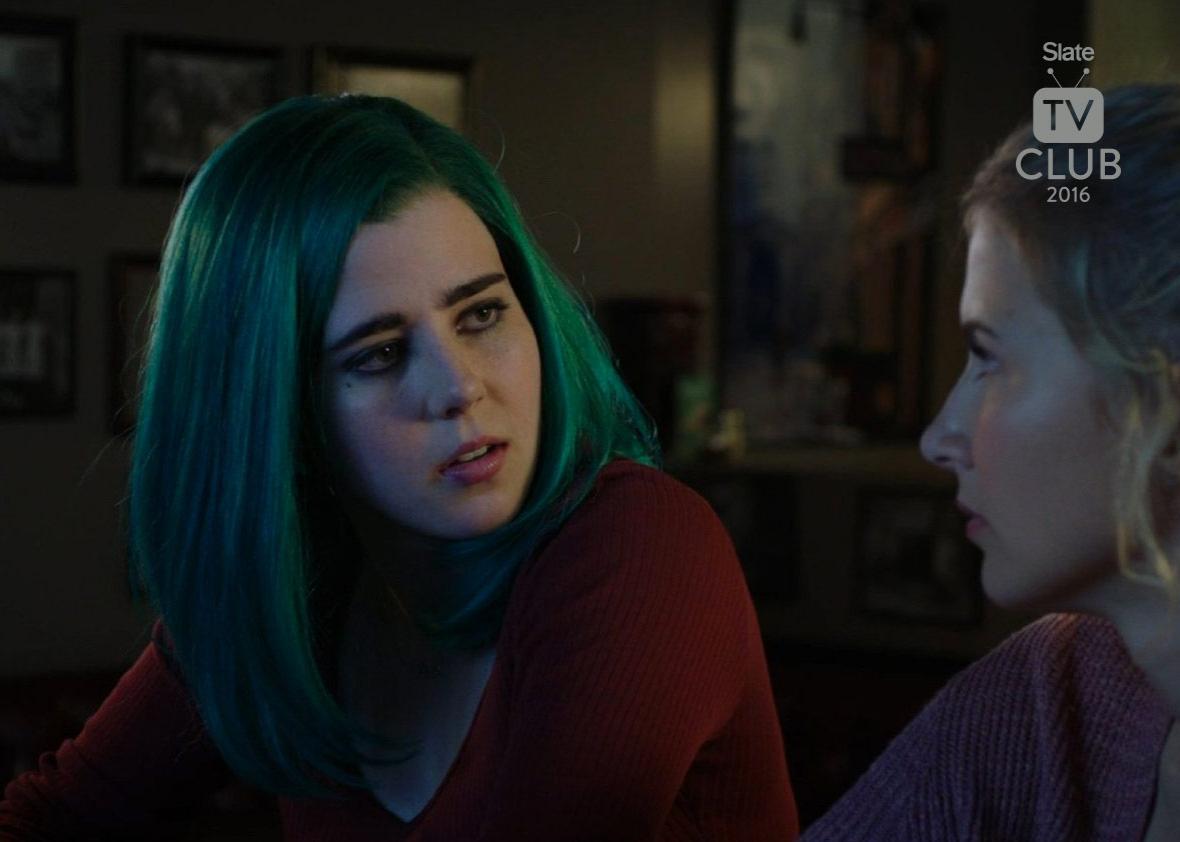If we’re talking about what was overlooked this year in television, of course, I have to bring up Degrassi: Next Class. It’s no secret that Degrassi is in my top three shows of all time and that I will probably still sing its praises from my deathbed. But my personal love aside? The show has unquestionably reinvigorated itself after moving to Netflix and switching up the cast a bit. It has always been a bit more ahead of its time than we all gave it credit for, but the past two seasons have been pretty exceptional. It no longer has that cutesy “very special episode” feel to it but instead treats these issues—queerness and sexual fluidity, racism and microaggressions, understanding your own white privilege, etc.—as more everyday, ongoing occurrences. Degrassi understands that the big problems aren’t solved in 22 minutes; the most recent season opened with a racism plot and then kept diving deeper, weaving it throughout the entire season and letting it bleed into other characters, other storylines. It’s still clumsy, but the show is certainly steadier than most of its peers in terms of sincerity, representation, and progressive politics. And next season, it appears it’s going to double-down on this: There will be another abortion storyline, and the school will open its doors to a handful of Syrian refugees. Degrassi! It’s still going there!
To be fair, my television tastes do skew more teen-centric than most critics—I am a teen at heart; I can’t help it!—so my other “Why aren’t more people talking about this?” show of the year is MTV’s Sweet/Vicious. It’s a monster of a premise: two female college students who team up to become vigilantes, stalking and hurting (and in one instance, murdering) rapists on their campus. It’s so darkly funny, so stealthily brilliant, and so surprisingly adept at navigating the emotional arcs of the survivor narrative. One of the girls, Jules, is a survivor herself, and this trauma is never forgotten but instead helps to build the rest of the series. Sweet/Vicious doesn’t use rape simply as a brutal plot device to knock a woman down for an hour—take note, other dramas!—but instead picks up in the aftermath. It’s such an important show and even more important that it airs on a youth-skewing network. Who needs an empowering survivor’s tale more than women on campus?
My other two big champions of the year, both of which showed up in weird places, are Seeso’s Take My Wife—a “lesbian show” that does not fall into the general trappings of “lesbian shows” (spoiler: Cameron Esposito and Rhea Butcher survive the whole season!) or become male gaze-y but also doesn’t ignore queer culture roots—and CNN’s United Shades of America—in which comedian W. Kamau Bell explores different subcultures and communities, including visiting the KKK. Both shows provided engaging glimpses into worlds that you may or may not be familiar with, but neither aired on a network to which people were paying attention.
To segue into Willa’s Hulu thoughts: I agree with them! Hulu is a streaming site that I’ve been rooting for (East Los High is fantastic, Deadbeat was fun, and Casual keeps getting stronger), but one that always seems to find a way to disappoint me. It’s home to a few of my “I’ll finish watching later” shows this year, like The Path (which I enjoyed the first half of, but it wasn’t enough to get me to return) and 11.22.63 (fine, but made me impatient and sleepy). They were both shows that I think would’ve stood out a lot more if not for the sheer amount of programming that we’ve been bombarded with. But maybe Hulu will find a really solid hit in the future—I have cautiously high hopes for Marvel’s The Runaways.
TBS is another network I think is due for a hit, and it certainly put out some quiet gems this year. We’ve talked a bit about Search Party, which wholly engrossed me for a day with its oddball mystery and that great, divisive ending. Full Frontal With Samantha Bee was, obviously, the biggest late night winner of the election and deserves all the accolades and year-end list placements. But what about the weirder comedies? The Detour took what I assumed would be a boring Vacation-like television show and churned out something crazier and surprisingly loving and honest in its portrayal of screwed-up families. Wrecked—which, admittedly, I haven’t finished yet either!—had a few solid early episodes that surprised me at how much I was laughing out loud. And People of Earth is just such a strange and unique venture, one that I like living in every week.
Also, yes, Pitch! Pitch isn’t great—there are so many kinks it needs to work out, and it needs to chill before it burns itself out—but it was one of the best shows to watch if you love allowing yourself to buy into emotionally manipulative scores (it is a sports narrative, after all) and capital-f Feminism that barely goes below the surface. It’s also great if you love yelling “KISS HER!” at the screen as much as I do. But I do genuinely like that the show took Ginny seriously even when, within the show, so many teammates and people took her to be a gimmick. It is a gimmicky show for sure, but Pitch does navigate its gimmickry better than expected.
There was certainly a lot of bad television (what exactly is up with all the men on CBS?), but fortunately there was always something else I could turn on instead, which is really all I can ask from television in any given year.
Why did I watch Pure Genius, Notorious, and Rush Hour?!
Pilot
